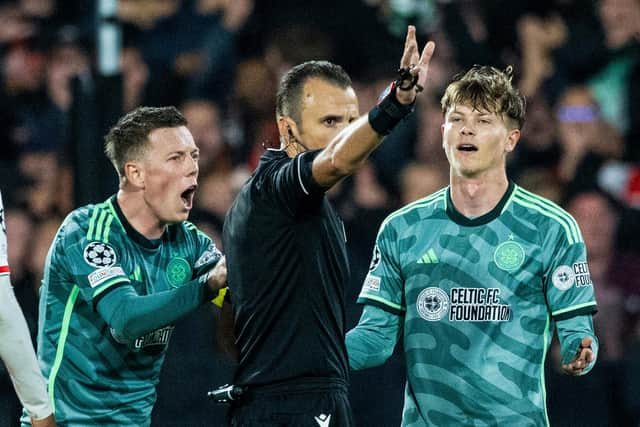Celtic's project players, absences and Kyogo - four key takeaways from failed Champions League campaign
Another disappointing Champions League campaign for Celtic concluded on a high with the late winner over Feyenoord, a result that puts a more positive spin on their record as it delivered a first group stage win since 2017 and a first at home for a decade. Here’s what else we’ve learned from Celtic’s journey over the last few months:
Project players for the most part won’t cut it at this level
Celtic’s recruitment model may be formed on financial prudence and a long-term investment strategy but it does little to help the manager in the here and now. There was an undoubted irony that the player who scored the late winner over Feyenoord, Gustaf Lagerbielke, is one of the glut of low-cost, high-potential players signed in recent years but by its very essence it is an approach that doesn’t deliver Champions League oven-ready operators. Moulding and improving these players to reach the standards required is a task Brendan Rodgers will undoubtedly relish but in the short term he needs experienced, battled-hardened figures alongside them who can hold their own against some of the best teams in the world. Rodgers has repeatedly made his appeal for that model to be tweaked to allow for more signings of that calibre and track record. The Celtic board now have two windows to deliver that for him ahead of a potential appearance in next season’s souped-up competition.
Advertisement
Hide AdAdvertisement
Hide Ad

The gap to the elite is getting bigger – but others are bridging it
The chasm between those clubs playing in Europe’s most lucrative leagues and those scrabbling around in the relative poverty of the smaller championships, like the SPFL, is only going to get larger. Given the disparity of the resources available to Atletico and Celtic, it was perhaps surprising that the Scots were able to hold them to a draw at home – less so the painful 6-0 drubbing they suffered in the reverse fixture in Madrid. Having the biggest bank balance, however, doesn’t guarantee success. It is not only Celtic whose European run has come to a sudden halt, with Manchester United, Newcastle United, Sevilla and Salzburg all also suffering the ignominy of finishing bottom of their respective groups. On the flip side, Copenhagen, PSV Eindhoven and Porto have shown that there is still a way for clubs from outside the Big Five leagues to reach the last 16. Celtic ought to take inspiration from their stories.
Injuries and indiscipline have taken their toll
Bad luck as well as hair-brained moments have contributed to Celtic’s struggles this season. Being deprived, at different points in the campaign, the chance to field Cameron Carter-Vickers, Reo Hatate, Liel Abada, Daizen Maeda and other prominent players undoubtedly made them weaker. Failing to keep 11 men on the park in the away matches against Feyenoord and Atletico also contributed substantially to the defeats in both, compounding an inherent naïve recklessness that emerges regularly on the road.
Liam Scales and other positive developments
It has not been all doom and gloom. Liam Scales’s emergence as a defender capable of competing in the Champions League has been a huge find for Celtic, culminating in another man-of-the-match performance against Feyenoord. The Irishman had one foot out the door in the summer but has hung around to become their most dependable defender throughout the campaign. Kyogo Furuhashi claimed his first and then second goals at this level, while Matt O’Riley continues to flourish as a class act. Honourable mention as well to Mitchel Frame, who played his part in the build-up to the winning goal on Wednesday after emerging off the bench for his Celtic debut aged just 17.